| |
Horseshoe Canyon - Canyonlands National Park
| Summary: |
An out and back hike to some of the best
pictograph panels anywhere. The hike has an elevation loss and gain of 750
feet and passes through the scenic drainage of Barrier Creek, which features
sheer sandstone walls, alcoves and groves of cottonwood trees. Most of the
pictographs found in the canyon were thought to have been painted between
2000 BC to 500 AD by groups of hunter-gatherers who pre-dated the Anasazi
and Fremont cultures. The panels are painted in a style known as “Barrier
Canyon” featuring dark, tapering, immobile human forms, painted in a dark
red pigment. These figures are frequently ghostly in appearance, hovering in
rows against a sandstone backdrop within alcoves.
The Rules: Pets are prohibited below the rim of Horseshoe Canyon. Group size
is limited to 20 people. Don't touch the pictographs! Pack animals are
allowed, and you'll see evidence to this effect. |
| Directions: |
From the town of Hanksville, drive north
on Highway 24 for 19 miles to between mileposts 135-136 and turn right
(Goblin Valley State Park is just north of this road). Drive 24 miles on
this well graded dirt road (suitable for passenger car) to a fork in the
road and information kiosk. Turn left heading towards Horseshoe Canyon and
drive 5 miles to a sign pointing right to the Horseshoe Canyon Trailhead.
Follow this somewhat rougher dirt road for about 2 miles to the trailhead,
which features a restroom, information kiosk and a few campsites. |
| Road
Conditions: |
High Clearance Vehicle (when roads are dry), a Passenger
Car will get you close (maybe all the way?) |
| Navigation: |
Easy |
| Length: |
6.5 miles |
| Date
Hiked: |
July, 2007 |
| Weather
Conditions: |
Hot and sunny |
|
Required Skills: |
 |
| Hike
Description: |
From the parking area, follow the well
marked path as it descends over slick rock towards the canyon. Along the way
you will pass a well preserved dinosaur footprint that is encircled in rocks
(the footprint is located right in the trail a few hundred yards prior to
reaching a water tank). The trail reaches a point that overlooks the canyon,
then descends along a sandy arc to eventually enter Horseshoe Canyon. Turn
right and begin walking up-canyon. Walking in Horseshoe Canyon alternates
between firm sand, loose sand and rocks. Simply follow the foot prints and
the main path as it winds its way along the canyon bottom. The path will
take you right to each of the four pictograph panels, the first of which
(the High Gallery) lies a short distance up-canyon high on the wall on the
left. Just beyond on the right hand side is the Horseshoe Shelter panel,
which contains several small abstract forms and a dog. Look for a use trail
on the right that leads up to some additional panels which were drawn at a
later date and feature a hunter with bow and arrow, elk and bison (the bow
and arrow was introduced into the Canyonlands area around A.D. 400).
Continue up-canyon another 3/4 of a mile to a large alcove on the right.
There are several forms located in the northern part of the alcove, though
they are not as well preserved as the others and exhibit some evidence of
vandalism. Another mile or so up-canyon you will arrive at one of the
largest pictograph panels in existence called the Great Gallery. This panel
is located in a prominent alcove on the right. There are ammo cans that
contain a register, informational papers and binoculars with which to better
view the panels. After enjoying the scene, return the way you came. |
| Rating
(1-5 stars): |
    
The author and his wife completed the hike on a very hot day in July at a
slow pace in about 6 hours lingering at each of the panels and taking an
afternoon nap in the shade of the Great Gallery. |
| Maps: |
None used |
| Books: |
Canyon Hiking Guide to the
Colorado Plateau - Michael Kelsey |
| Photos: |
Click picture for larger
view, click your browser's 'Back' button to return to this page. |
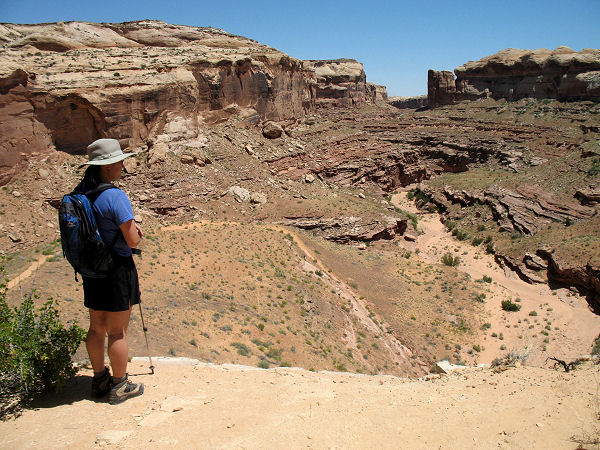 |
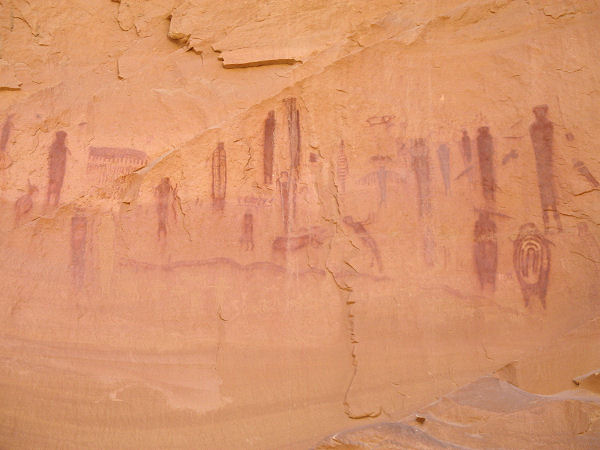 |
| Descending into Horseshoe
Canyon. |
Scene from the High Gallery. |
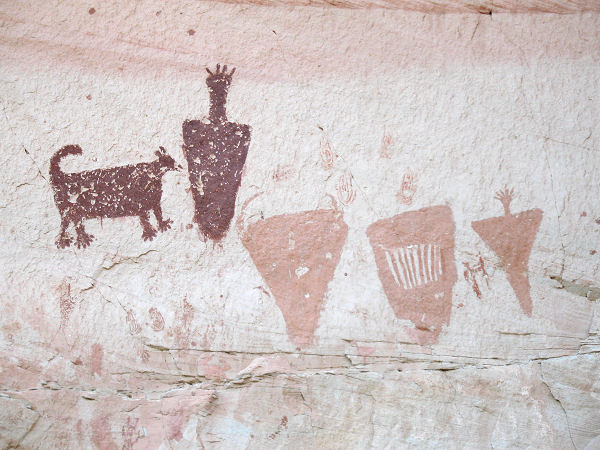 |
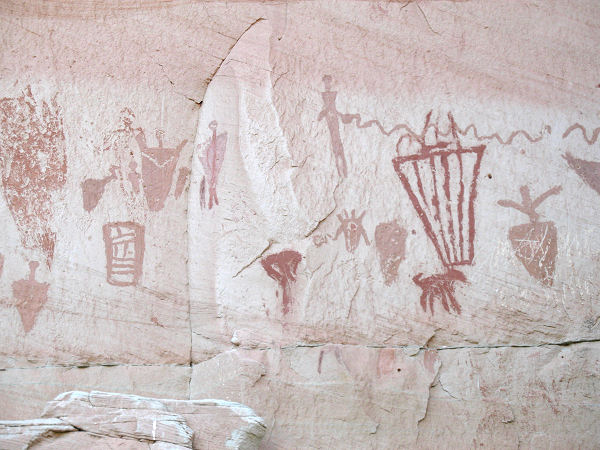 |
| Scenes from the
Horseshoe Shelter panel. |
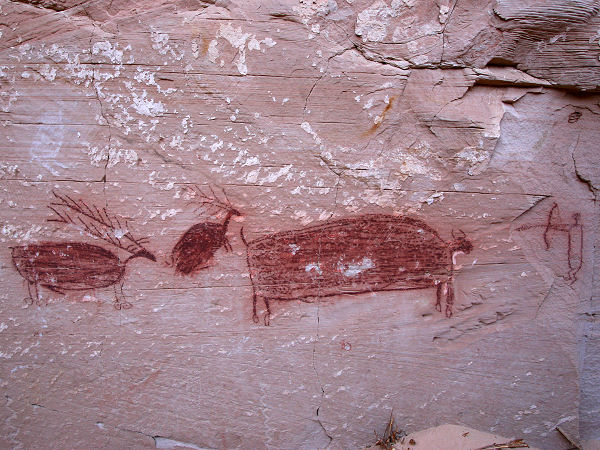 |
|
Hunting scene from the
Horseshoe
Shelter panel. |
|
 |
| A
panorama photo of the Great Gallery. |
|
|

